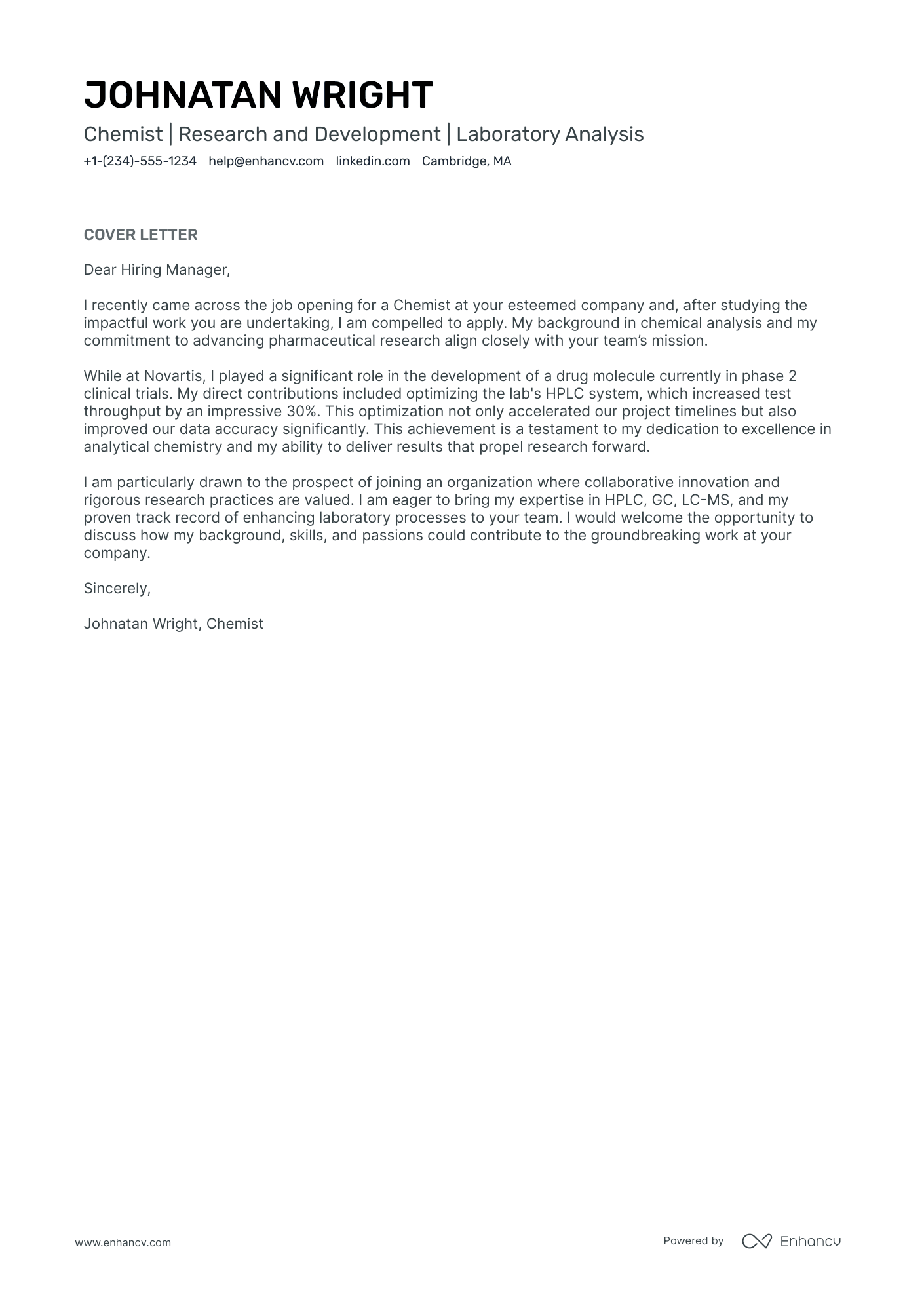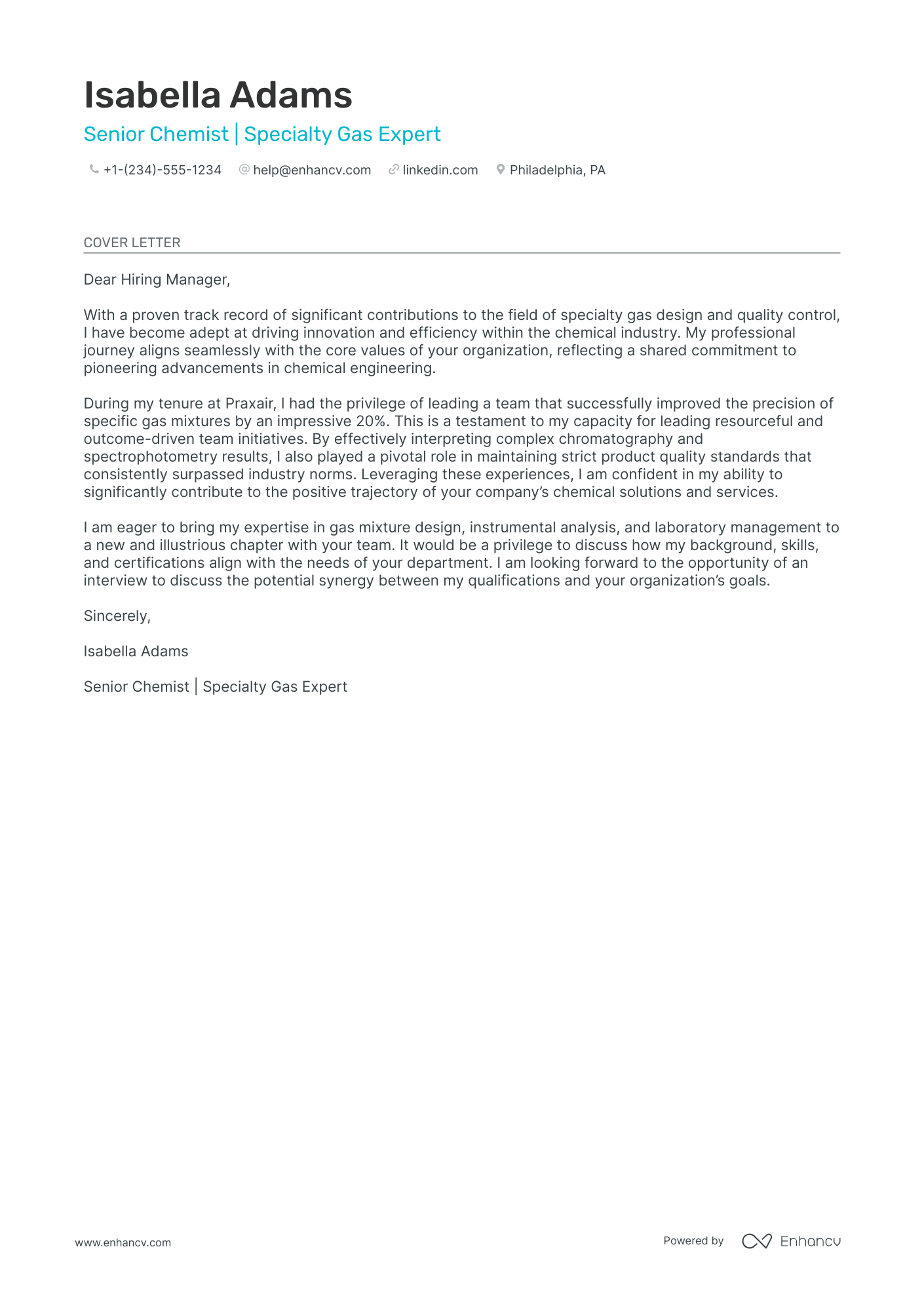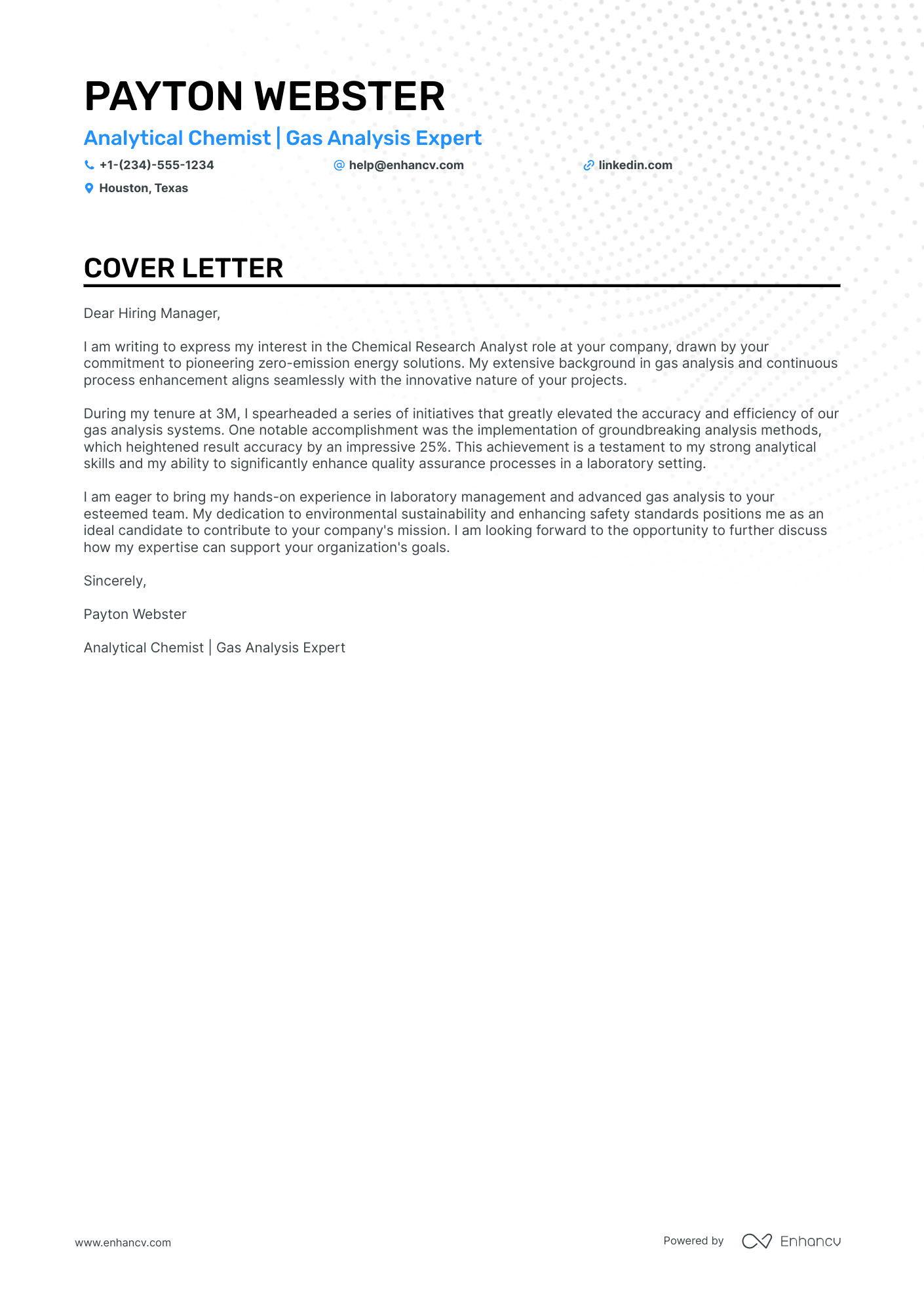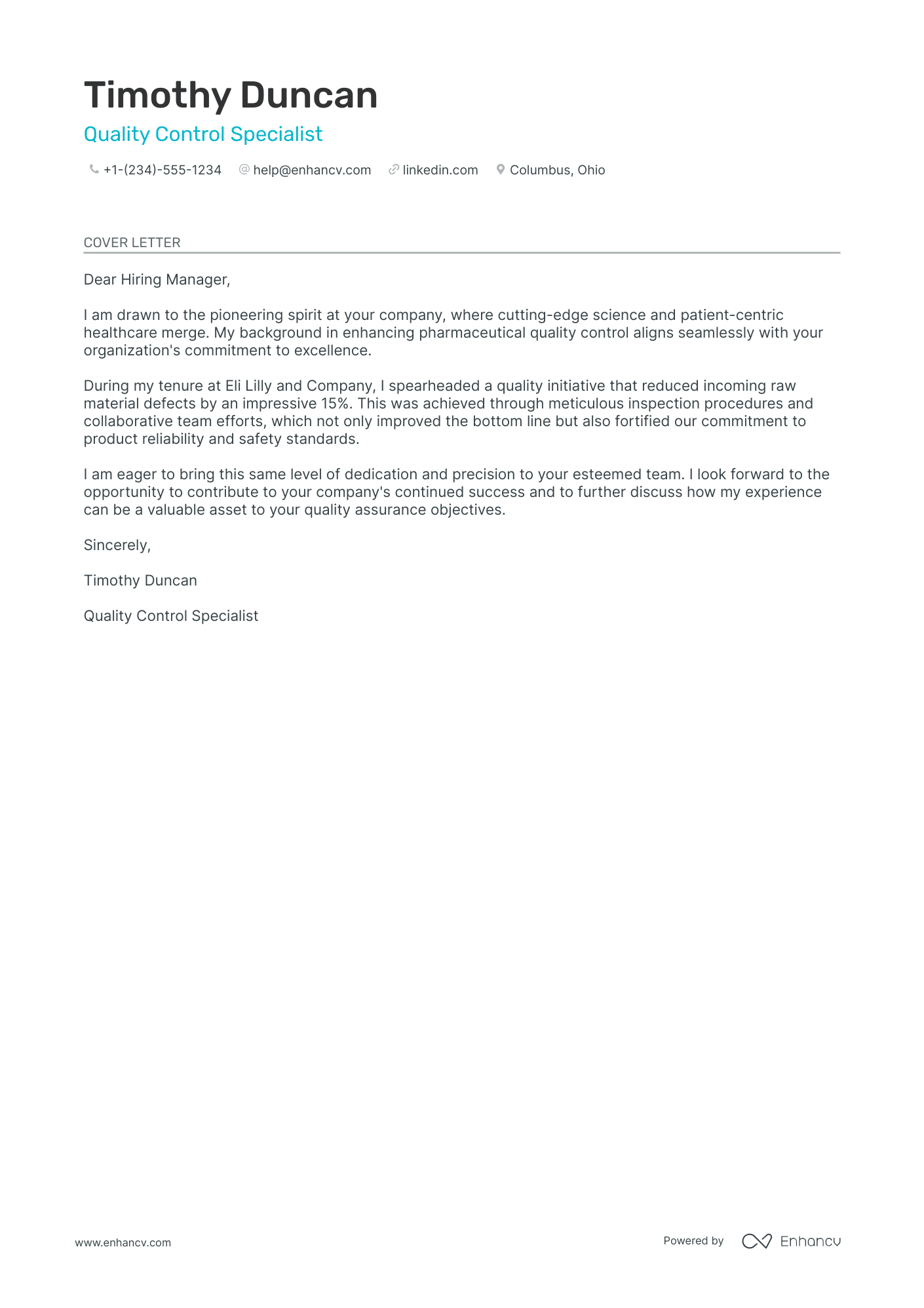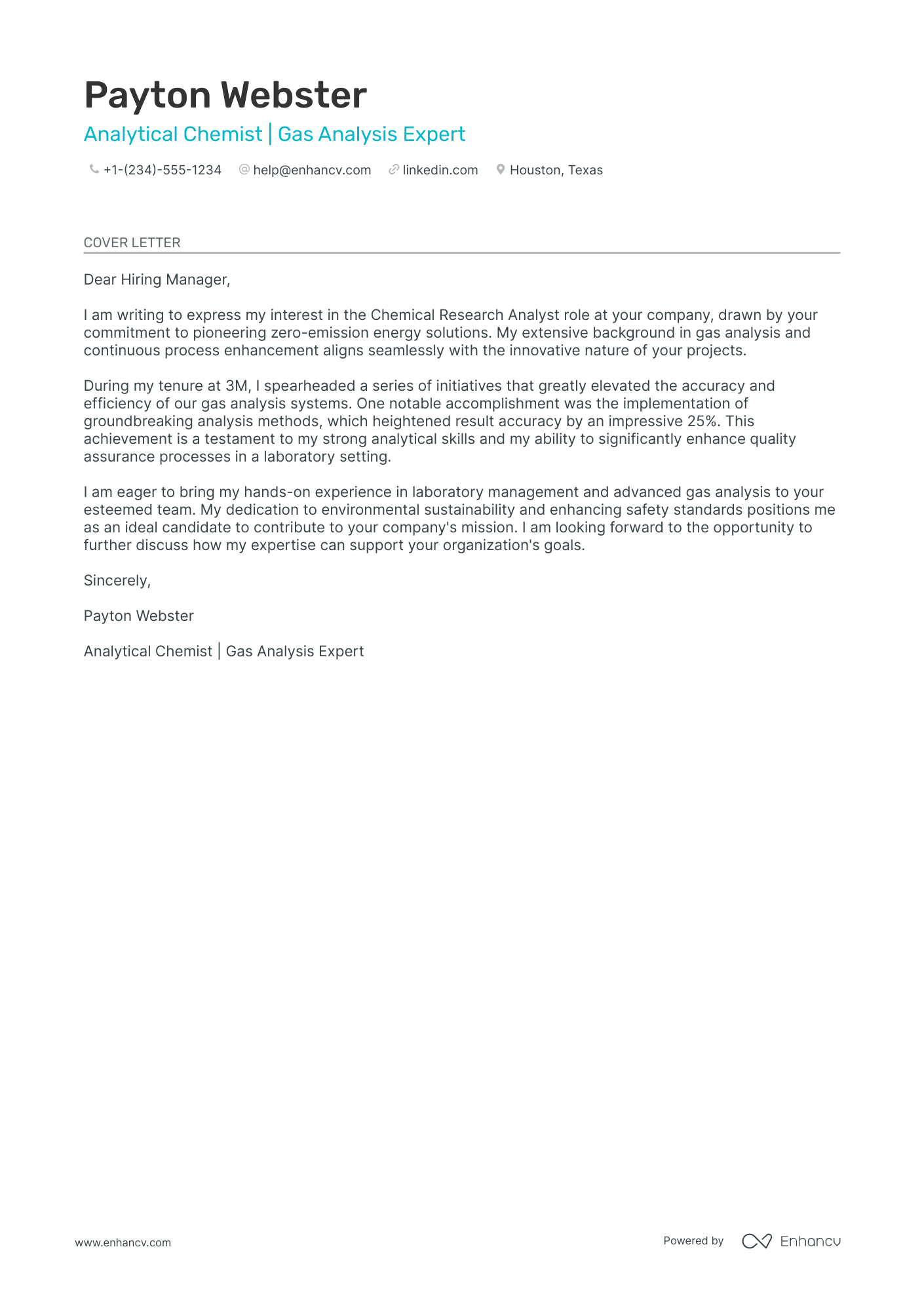Crafting a compelling chemist cover letter can often seem like a daunting task, especially when you're already deep in the job-hunting process and realize it's a crucial requirement. It's essential to convey your unique scientific accomplishments without repeating your resume. Think of that one significant achievement you're immensely proud of and weave it into a narrative that's both formal and fresh, steering clear of worn-out phrases. Remember, brevity is key; keep it to one page of engaging, personalized storytelling.
- Including all the must-have paragraphs in your structure for an excellent first impression;
- Learning how to write individual sections from industry-leading cover letter examples;
- Selecting the best accomplishment to tell an interesting and authority-building professional story;
- Introducing your profile with personality, while meeting industry standards.
And, if you want to save some time, drag and drop your chemist resume into Enhancv's AI, which will assess your profile and write your job-winning cover letter for you.
If the chemist isn't exactly the one you're looking for we have a plethora of cover letter examples for jobs like this one:
- Chemist resume guide and example
- Clinical Research Coordinator cover letter example
- Student Researcher cover letter example
- Quantitative Researcher cover letter example
- Quality Control Chemist cover letter example
- Radiologic Technologist cover letter example
- Researcher cover letter example
- Lab Manager cover letter example
Drop your resume here or choose a file.
PDF & DOCX only. Max 2MB file size.
Chemist cover letter example
HENRY JACKSON
Los Angeles, California
+1-(234)-555-1234
help@enhancv.com
- Highlighting specific achievements and quantitative results, such as "a 20% increase in throughput," serves to provide concrete evidence of the candidate's potential impact on the company's operations.
- Demonstrating specialized expertise with relevant technical skills, such as "HPLC assays," directly aligns with the company's industry and shows the candidate is well-prepared to address specific challenges.
- Emphasizing a commitment to industry standards, like "upholding the rigorous safety standards," indicates the candidate's understanding of the importance of compliance and quality in pharmaceuticals.
- Expressing alignment with the company's mission and values shows the candidate has done their research and is genuinely interested in contributing to the company's goals.
The format of your chemist cover letter: structure, fonts, margins, and more
Your chemist cover letter should include a header (with your name, position, and date); a greeting and introductory paragraph; a body and closing paragraphs; and an optional signature.
Remember that you're writing your chemist cover letter for recruiters - as the Applicant Tracker System won't scan this content.
Here are a few more tips and tricks to keep in mind when formatting your chemist cover letter:
- Use the same font in your chemist cover letter and resume. We recommend modern fonts, e.g. Lato and Rubik, to help you stand out, instead of the stereotypical Arial and Times New Roman.
- Each paragraph should have single spacing, which is already set up for you in our cover letter templates.
- Our cover letter builder follows industry standards for your chemist cover letter formatting - with a one-inch margin, surrounding your content.
- Always export your chemist cover letter in PDF to ensure the image or text quality stays the same and your writing isn't moved about.
Need a cover letter, but short on time? Use our free cover letter generator to create one from your resume in no time.
The top sections on a chemist cover letter
- Header: This section should include the chemist’s name, address, phone number, email, and the date the cover letter is written to provide clear contact information which is essential for the recruiter to follow up.
- Greeting: A personalized salutation addressing the specific hiring manager or the head of the chemistry department shows the chemist has done their research and is genuinely interested in the position within that company or institution.
- Introduction: The introduction should grab the recruiter’s attention by briefly stating the chemist's background, the position they are applying for, and a compelling reason why they are interested in this specific role in the chemistry field.
- Professional Experience & Skills: This section should highlight the chemist's relevant expertise and any special skills or accomplishments in chemistry, showcasing why they are the best fit for the role and how they can contribute to the team or research projects.
- Closing: The closing should reaffirm the chemist's interest in the position, invite the recruiter to review the enclosed resume, and include a proactive statement about following up, signaling the applicant's enthusiasm and proactive approach.
Key qualities recruiters search for in a candidate’s cover letter
- Strong analytical and problem-solving abilities: Critical for analyzing chemical compositions and addressing scientific challenges.
- Attention to detail: Essential for conducting precise experiments and avoiding contamination or measurement errors.
- Proficiency in laboratory techniques and instrumentation: Employers seek candidates who are adept with relevant equipment and methodologies.
- Knowledge of safety protocols and chemical handling: Ensuring safety in the lab is paramount and indicates a responsible professional.
- Research and development experience: Demonstrates the capability to innovate and contribute to advancements in chemistry.
- Effective communication and teamwork skills: Important for collaboration with multidisciplinary teams and for explaining complex concepts to non-specialists.
How to personalize your chemist cover letter greeting
Before you start writing your chemist cover letter, take the time to find out who is recruiting for the role.
Search for the recruiter's name on LinkedIn or the corporate website to address them personally in your chemist cover letter salutation.
What if you can't find out who's recruiting for the role?
Always aim to avoid the very impersonal "Dear Sir/Madam" - instead, opt out for "Dear HR Team" or "Dear Hiring Manager" to make a better first impression.
List of salutations you can use
- Dear Dr. [Last Name],
- Dear Professor [Last Name],
- Dear Mr./Ms. [Last Name],
- Dear Hiring Manager,
- Dear Search Committee,
- Dear [Title] [Last Name],
Your chemist cover letter intro: showing your interest in the role
On to the actual content of your chemist cover letter and the introductory paragraph.
The intro should be no more than two sentences long and presents you in the best light possible.
Use your chemist cover letter introduction to prove exactly what interests you in the role or organization. Is it the:
- Company culture;
- Growth opportunities;
- Projects and awards the team worked on/won in the past year;
- Specific technologies the department uses.
When writing your chemist cover letter intro, be precise and sound enthusiastic about the role.
Your introduction should hint to recruiters that you're excited about the opportunity and that you possess an array of soft skills, e.g. motivation, determination, work ethic, etc.
What to write in the body of your chemist cover letter
Now that you've got your intro covered, here comes the heart and soul of your chemist cover letter.
It's time to write the middle or body paragraphs. This is the space where you talk about your relevant talent in terms of hard skills (or technologies) and soft (or people and communication) skills.
Keep in mind that the cover letter has a different purpose from your chemist resume.
Yes, you still have to be able to show recruiters what makes your experience unique (and applicable) to the role.
But, instead of just listing skills, aim to tell a story of your one, greatest accomplishment.
Select your achievement that:
- covers job-crucial skills;
- can be measured with tangible metrics;
- shows you in the best light.
Use the next three to six paragraphs to detail what this success has taught you, and also to sell your profile.
Closing paragraph basics: choose between a promise and a call to action
You've done all the hard work - congratulations! You've almost reached the end of your chemist cover letter.
But how do you ensure recruiters, who have read your application this far, remember you?
Most chemist professionals end their cover letter with a promise - hinting at their potential and what they plan on achieving if they're hired.
Another option would be to include a call for follow-up, where you remind recruiters that you're very interested in the opportunity (and look forward to hearing from them, soon).
Choose to close your chemist cover letter in the way that best fits your personality.
No experience chemist cover letter: making the most out of your profile
Candidates who happen to have no professional experience use their chemist cover letter to stand out.
Instead of focusing on a professional achievement, aim to quantify all the relevant, transferrable skills from your life experience.
Once again, the best practice to do so would be to select an accomplishment - from your whole career history.
Another option would be to plan out your career goals and objectives: how do you see yourself growing, as a professional, in the next five years, thanks to this opportunity?
Be precise and concise about your dreams, and align them with the company vision.
Key takeaways
Writing your chemist cover letter has never been easier, so remember to:
- Select a chemist cover letter template that automatically meets industry formatting (e.g. has one-inch margins, is single-spaced, is in PDF, etc.);
- Make your chemist cover letter personal by mentioning the recruiters' first or last name;
- Within the introduction, describe what you like best about the company in no more than two sentences;
- Use your chemist cover letter body to tell a story of your greatest achievement, backed up by job-relevant skills and technologies;
- If you have no professional experience, be honest about it in your chemist cover letter, but also write about your unique talents.
Chemist cover letter examples
By Experience
Entry Level Chemist
Senior Chemist
By Role
